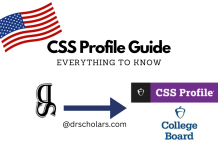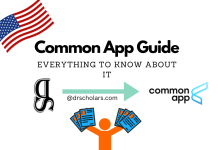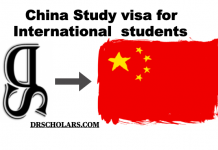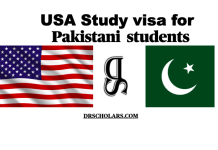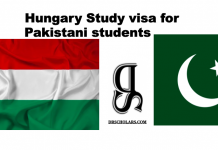After getting admission to your desired Dutch university, the next step is how to apply for a Netherlands study visa.
The rules for a long-term study visa (MVV) are constantly changing with respect to the financial statements & language requirements.
This is why we felt the urge to take a deep dive into the subject.
The ultimate Netherlands study visa guide will not only solve your every query about documentation & Appointments but will also prepare you for the possible visa interview questions.
The reason, Netherlands is probably the best destination for international students is because of its extremely welcoming society & 9 out of 10 people can speak English.
There are more than 2000 programs available for international students in English, plus students can support themselves by working 16 hours per week (part-time job).
Don’t forget the FAQs & summary at the end of the blog.
Netherlands Study visa
1. Types of Netherlands study visas for International Students
3. Visa process time for Netherlands student visa
4. Netherlands Consulates and Embassies
5. Requirements for Netherlands Student Visa
6. How to Apply for Netherlands Student Visa
7. Interview Questions for Netherlands Student Visa
8. Netherlands Student Visa Success rate
Check our detailed guide about Spain’s student visa.
1. Types of Netherlands study visa for International Students
There are two types of Netherlands study visas for international Non-Eu students. Depends on the duration of time the student wants to spend in Netherlands.
1.1. Netherlands Schengen visa (Short-term, Less than 90 days)
1.2. Netherlands MVV (Long-term, More than 90 days)
Let me explain.
1.1. Netherlands Schengen visa (short term-Less than 90 days)
If the student is applying for a “Short Course” “Apprenticeship/Internship” “Seminars”, or “Vocational training” or “Exchange & mobility program”, or “University single course” that only requires them to stay in the Netherlands for up to 90 days then the applicant should apply for “Netherlands Schengen visa”.
Applicants can download the form for the Netherlands Schengen visa here.
Applicants can also apply for it online by creating an account online here.
Students from certain nationalities can also apply for it by contacting a third party like VFS Global etc website.
1.2. Netherlands MVV visa & Residence permit (Long-term More than 90 days)
In most cases if the student is applying for a full-time Bachelor’s, Master’s, PhD or Internship, or any research project, then their duration will take more than 90 days, so they should apply for an MVV visa (Authorization for temporary stay). (MVV stands for Machtiging tot voorlopig verblijf)
Later the students will apply for VVR (Netherlands Residence permit) because MVV is only valid for 90 days or their institutions will submit their residence permit application to the Immigration and Naturalisation Service (IND).
Students are advised to apply at least 3 months before their intended stay.
Remember students can apply for a Netherlands study visa either through a host in the Netherlands or personally at the Netherlands embassy.
Students from certain nationalities can also apply for it by contacting through a third party like VFS Global etc website.
Check step by step process of the Italy study visa.
1.3. Study programs & Netherlands Visa table
|
Study Programs |
Stay of Duration |
Type of Netherlands student visa |
|
Exchange & mobility program |
Less than 90 days |
Netherlands Schengen visit visa |
|
University single course |
Less than 90 days |
Netherlands Schengen visit visa |
|
Vocational training |
Less than 90 days |
Netherlands Schengen visit visa |
|
Academic short course |
Less than 90 days |
Netherlands Schengen visit visa |
|
Apprenticeship |
Less than 90 days |
Netherlands Schengen visit visa |
|
Full-time Graduate or post-graduate programs |
More than 90 days |
Netherlands MVV visa & Residence permit (later) |
|
Exchange & Mobility program, University single course, Vocational training, Academic short course, Apprenticeship |
IF More than 90 days |
Netherlands MVV visa & Residence permit (Later) |
NOTE:
Students who are staying for more than 4 months in Netherlands must register with the Dutch municipality where they are living.
Their information will then be entered into the Personal Records Database (BRP).
If they are staying less than 4 months, their information will be entered into the Non-residents Records Database (RNI).
Later they will be given (BSN) citizen service number.
2. Netherlands study Visa Fee
While for The Netherlands Schengen visit visa (less than 90 days ) fee is 80 euros. While The Visa Fee for MVV (long-term – more than 90 days) is 171 euros. (which could change depending on the purpose of stay & nationality.)
Later to apply for a residence permit (VVR) Students need to pay up to 210 euros.
If the student is applying at an embassy or consulate-general, they can pay the fee in local currency by hand, when submitting the application. The exchange will be calculated & rounded off.
If you want to study in the UK, check out our ultimate UK study visa guide.
3. Visa process time for Netherlands study visa
According to official statements, it takes only 15 days for both MVV(Long-term study visa ) & Schengen visa (Short term stay), however, the visa processing time is subject to change & depends upon
The Applicant’s Nationality,
embassy in that particular region,
Number of applicants
and
sometimes specific requirements of the Applicant’s case.
SO technically The visa process time for a Netherlands study visa for Non-Eu countries can take from 30 to 60 days.
That is why international Students are advised to apply at least 3 months before their intended stay.
Here is our detailed guide about Sweden study visas.
4. Netherlands Consulates and Embassies
The embassies and consulates of Netherlands are in all countries of the world.
Immigratie-en Naturalisatiedienst (Immigration and Naturalisation Service) is responsible for guiding & giving visas to all Applicants including international students.
Other important websites for international students related to the Netherlands are given below.
If You have any questions related to your Netherlands study visa or any other study visa, you can also contact us for a live one-on-one session.
Whatsapp Contact: +393512735708
5. Requirements for Netherlands Study Visa
5.2. Passport-size photographs
5.7. IELTS for Netherlands Study Visa
5.9. Admission Letter from Netherlands University
5.10. Financial Documents for Netherlands study visa
5.12. PCC for Netherlands study visa
5.15. Proof of university legal fee
5.16. Copy of Hotel Reservation & Flight Booking
5.17. Family Registration Certificate (FRC)
5.18. NOC: NO Objection Certificate (Optional)
5.19. Certificates of extracurricular achievements
5.20. Corona Vaccination Certificates
5.21. Marriage and Childbirth Certificate
5.1. Visa Application form
Choose your Netherland study visa category carefully & fill in all the questions.
– For short-term Netherlands study visa:
The applicant should apply for a “Netherlands Schengen visa”.
Applicants can download the form for the Netherlands Schengen visa here.
Applicants can also apply for it online by creating an account online here.
– For Long term Netherlands Study visa:
Applicant should fill out the form for MVV visa (Authorization for temporary stay). (MVV stands for Machtiging tot voorlopig verblijf)
Later the students will apply for VVR (Netherlands Residence permit).
International Students can also contact their representative consulates of Netherlands in their home country for more details.
Students from certain nationalities can also apply for it by contacting a third party like VFS Global etc website.
How to apply for an Australian study visa? check our step-by-step process.
5.2. Passport-size photographs
The general picture format for the Netherlands student visa is the following.
A. Two recent (within 6 months) passport-size (35x45mm) photos.
B. White background with neutral facial expressions. (Unedited)
C. Avoid uniforms & the head should be 80% in the photo.
D. The applicant should look at the camera.
E. one photograph should be glued to the visa application while the other should contain the applicant’s full name on the reverse side, & should be attached with a paper clip to the visa form.
The same rules apply to every Schengen country.
5.3. Valid Passport
A: A passport must have at least 18 months of validity from the date of visa application.
B: Applicants will also provide visa copies (if they have any).
C: The passport must have at least two blank pages.
D: All the previous passports must also be attached. (If they have any)
Check our detailed guide about Finland student visas.
5.4. CNIC
A birth certificate and a National Identity card are mandatory for a Netherlands student visa.
5.5. Academic Documents
It includes all academic records & certificates.
A. Certificate & transcript of Bachelor’s (If a student is applying for a master’s program)
B. Certificate & transcript of Master’s (If a student is applying for a Ph.D. program)
C. Transcript (DMCs) of Metric & FSC and certificates (if a student is applying for a bachelor’s degree)
D. Proficiency certificate in English from the university.
E. Course summary which explains current courses & previous courses.
F. Provide two Recommendation Letters from your university along with the referee’s detail.
5.5.1. Translated Documents contain:
A. Confirmation from Translation Company/Translator
B. Translation Date
C. Name and Signature of the Translator
D. Translator’s Contact Details
NOTE:
The above-mentioned documents must be attested by respective universities and boards.
For example, in the case of Pakistan, it must be attested by IBCC, HEC, and MOFA (Ministry of Foreign Affairs).
IBCC authority is only responsible for the attestation of metric and inter documents.
Dear offices are present in Peshawar, Karachi, Lahore, Islamabad, and also in other cities of Pakistan.
HEC office attests to Bachelor’s, Master’s, and Ph.D. documents.
Other International students should attest their documents from their own respective ministries & authorities.
5.6. CV
CV is compulsory for the university admission process and optional for embassy interviews.
It should contain all the contact details and academic information.
Students can make a perfect Cv in Europass here in under a few minutes.
5.7. IELTS for Netherlands Study Visa
There are no specific mentions of IELTS for Netherlands study visas on their immigration website. However, IELTS is compulsory for many departments in Dutch universities.
Having a strong band in IELTS certainly increases your chances of securing admission & a student visa.
For Bachelor’s an overall 6 bands while for a Master’s 6.5 bands is good if the courses are taught in English.
Therefore, Students from NONEU countries are advised to do IELTS (Or TOEFL) to avoid any hassle.
Some very few universities may rely on English proficiency certificates. And then the immigration officer may arrange an interview to test the applicant’s language abilities.
But the chances of getting a visa for a nonEu applicant without IELTS is comparatively very low.
5.8. Statement of Purpose/Letter of Motivation/cover letter
This document comprises the following information about the student
A. Previous academic documents and studies
B. Employment Status
C. Relationship with your home country
D. Immigration History
E. Economic conditions of the applicant
A statement of purpose (SOP) & letter of motivation (LOM) are almost the same thing & could be interchangeable.
The maximum length of this letter is three pages, But it is advised to make it short & concise to one page.
5.9. Admission Letter from Netherlands University
After getting admission to a Netherlands university, they will issue you an invoice to pay the fee.
When you pay the fee, the university will issue you another unconditional Admission letter.
This letter is extremely important for the Netherlands study visa.
To avoid any extra hassle, it is advised that the university fee should be paid before starting the immigration process from your home country & keep the receipt.
NOTE:
Remember admission letter could also be in the form of a university formal invitation or internship or training program.
It could also include accommodation proof and details of the organization supporting the student.
If you want to study in china, check out our ultimate Chinese study visa guide.
5.10. Bank statement for Netherlands Study Visa
According to the calculation of Netherlands Immigration officials, international students will need at least 957 euros per month. Which means 11,484 euros per annum.
So it is advised to show the bank statement of at least € 12,000 for a Netherlands study visa to prove that applicant is capable of covering their expenses for at least one year.
Bank Statement must be signed and stamped by the bank officer.
The bank account must be in the name of the student.
This amount should be shown irrespective of the university fee.
In the case of a scholarship or grant, there is no need of showing a bank statement.
5.10.1 SPONSORSHIP
In the case of sponsorship, the applicant should make an Affidavit of the sponsor, in which they will state their relationship.
The sponsor is also required to show the tax return for the last two years.
Property Details & other Income sources of the sponsor are also required.
5.11. Health Insurance for Netherlands student visa
Students are legally required to have health insurance in Netherlands to cover health expenses like hospitalization and even transport to their home country in case of emergency.
International students from Non-EU countries must apply for health insurance in their home country before coming to Netherlands.
Students can learn about the different kinds of health insurance according to their condition here.
5.12. PCC (Police Clearance Certificate) for Netherlands student Visa
International students who want to apply for Netherlands MVV (Long-term, More than 90 days) must submit a document showing a history of a criminal record.
This document must be issued by the country of your residence within five months of starting the visa application.
Generally, PCC can be issued by your local security police station or many international students can also make it online.
Indian students can make it through Passport seva, and Pakistani students can make it in “Police Khidmat Markaz” or ICTP app or ICTP website.
International Students normally don’t need PCC for short-term Netherlands Schengen visas, however, it’s better to cross-check the requirement with your local Dutch consulate.
5.13. Medical certificate
International students must submit a medical certificate. It demonstrates that the applicant is not suffering from any serious disease that has repercussions for public health.
The medical certificate must be issued within 90 days of submitting the visa application, signed, and stamped by the doctor.
Students must provide test proof of Tuberculosis and Hepatitis A and B. (In the case of some countries).
Check our detailed guide about Norway student visas.
5.14. Payment of the visa fee
The Netherlands Schengen visit visa (less than 90 days ) fee is 80 euros. While The Visa Fee for MVV (long-term – more than 90 days) is 171 euros. (which could change depending on the purpose of stay & nationality.)
Later to apply for a residence permit (VVR) Students need to pay up to 210 euros.
Students can pay this non-refundable visa fee through an online debit card and fill out an application. For online payment, the debit card must be activated.
If the student is applying at an embassy or consulate-general, they can pay the fee in local currency by hand, when submitting the application. The exchange will be calculated & rounded off.
5.15. Proof of university legal Fees for Netherlands Study visa
The Tuition fee for bachelor’s programs in the Netherlands is between € 6,000 and € 15,000 and for master’s programs it’s between € 8,000 and € 20,000.
International Students must provide a receipt of the fee from the university. It could be the first-semester fee or the fee for the whole year.
When you pay the fee to the Netherlands university, they will send you one unconditional letter, the applicant needs to apply with that letter for the study visa.
5.16. Copy of Hotel Reservation & Flight Booking
The booking confirms the arrival date in a particular country.
The hotel reservation shows that a student researched the process.
5.17. Family Registration Certificate (FRC)
A family registration certificate (FRC) is a document that tells that the family record of the student is complete in the database of the home country.
This document contains details of the name and information of the parents and siblings.
This document is very much important in case of extending a residence permit or in case of permanently settling in the Netherlands.
International students can get it from their local ministries & authorities.
Pakistani students can get FRC through NADRA offices in Pakistan. They can also apply for it online.
5.18. NOC: No Objection Certificate (Optional)
It also varies from country to country. It is compulsory for some countries and known as NOC.
NOC must be written by the Dean or HOD of the university.
This letter will include that the student is applying for a student visa to the Netherlands & they will return to the country after completing their education.
5.19. Certificates of extracurricular achievements (Optional)
These certificates include internship certificates and experience letters.
The embassy gives extra value to these certificates.
5.20. Corona Vaccination Certificates
Students must complete the COVID-19 vaccination before the interview appointment at the embassy.
The administered vaccines are listed by the WHO (World Health Organization).
5.21. Marriage and Childbirth Certificate
The embassy may ask about Childbirth Certificates and marriage certificates.
It is better to bring both childbirth and marriage certificates along with you.
NOTE: Students should carry all these documents along with their photocopies when applying for a Netherlands student visa.
The Embassy reserves the right to ask for additional documents, that why it’s good to carry the optional documents.
If you want to study in Italy for free, find out our detailed guides about DSU and EDISU scholarships.
6. How to Apply for Netherlands Study Visa
International students can apply for a Netherlands study visa by following 5 easy steps.
- Search for your desired courses & Get admission in the Netherlands by following this University finder.
Students can also apply to universities directly or through Studielink. (Official registration and application portal for programs at Dutch higher education institutions.) - Fulfill the list of 21 docs we discussed above in detail.
3. Make an appointment or apply for a visa online through The embassies and consulates of the Netherlands or their representatives in your area. Some embassies can also ask to write an email for an appointment.
4. Pay the visa fee, through a bank or debit card or in local currency at your near consulate.
The fee for a Netherlands Schengen visit visa (less than 90 days ) is 80 euros.
While The Visa Fee for MVV (long-term – more than 90 days) is 171 euros. (which could change depending on the purpose of stay & nationality.)
5. Wait for the interview. It could happen on the phone or online or in person at the consulate.
The list of possible interview questions is given below.
NOTE:
Students from certain nationalities can also apply for it by contacting a third party like VFS Global etc website.
If you want to study in the UK for free, find out our detailed guides about Chevening and Commonwealth scholarships.
7. Interview Questions for Netherlands Study Visa
There is common questions student face during their visa interview.
These questions vary from profile to profile and are given below:
Name of the student & questions about previous educational qualification?
What is your purpose for going to the Netherlands?
Did you already search for opportunities in your home country?
Where is the university located in the Netherlands?
Who is your sponsor? What is your relationship?
What is your course structure or Course summary?
Which course you will start at the university?
Why did you choose this university and subject?
How will this course shape your career?
How did you find this university?
What are your plans after the completion of the course?
Who advised this accommodation and how much will be?
When will your course start?
Why did you choose Netherlands and not another country?
What is the capital of Netherlands and the spoken language?
Can you name other cities where famous universities exist?
Did you do an examination or a test made by the university?
Please name the person with whom you are in contact at the university.
Where will you stay in the Netherlands?
How much do you expect to spend per month in your destination city? On your rent, food & fee.
Is there any information to tell us to support your application?
8. Netherlands Study Visa Success rate
The reasons for rejecting the Netherlands study visa application by immigration authorities could be the following.
A: Insufficient funds.
B: Irregularity in studies or less resemblance with future studies.
C: Lack of English Language fluency
D: Not able to give proper convincing answers during the visa interview.
E: Lack of good communication skills.
The success rate for accepting the Netherlands study is almost 82%. Students need to be very cautious to fulfill all the requirements we discussed in this guide.
9. FAQs (Frequently Asked questions about Netherlands Study visas)
9.1. Can a student work on a study visa in the Netherlands?
Yes. A student can work part-time for 16 hours per week on a study visa in Holland (Netherlands). For that, a residency permit is mandatory.
They can also work full-time during summer holidays like (June, July, and August).
The Specific details about the work can be seen here on UWV website.
If students want to do a work-related internship, then they can see the details here.
Students can work for unlimited hours if they are self-employed, as long as they are passing more than 50% of their credit hours to continue & extend their stay.
9.2. Can a student get PR (Permanent residence) after studying in the Netherlands?
Yes. After completing their education at a Dutch university, international students have to find a job & fulfill the tax requirements for Netherlands permanent residency.
PR will open new doors of opportunities & international students can even apply for loans to start their businesses in the Netherlands.
Applicants can also check different types of residence permits here.
If you want to study in Germany for free, find out our detailed guide about DAAD scholarship.
10. Netherlands study visa for international students (SUMMARY)
1. Take admission in your desired course in any dutch university, & apply for the correct visa.
2. Prepare the list of documents we discussed above in detail.
3. Pay the visa fee & provide financial resources and bank statement details.
4. Appear at the visa interview & wait for the result. It will take some time.
We tried to cover everything about the Netherlands study visa, but if you still have any questions, please don’t hesitate to ask us in the comments.
If You have any questions related to your Netherlands study visa or any other study visa, you can also contact us for a live one-on-one session.
Whatsapp Contact: +393512735708
